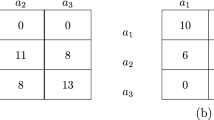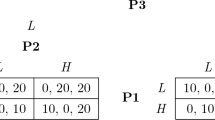Abstract
We study the structure of unstable power mechanisms. A power mechanism is modeled by an interaction form, the solution of which is called a settlement. By stability, we mean the existence of some settlement for any preference profile. Configurations that produce instability are called cycles. We introduce a stability index that measures the difficulty of emergence of cycles. Structural properties such as exactness, superadditivity, subadditivity and maximality provide indications about the type of instability that may affect the mechanism. We apply our analysis to strategic game forms in the context of Nash-like solutions or core-like solutions. In particular, we establish an upper bound on the stability index of maximal interaction forms.
Similar content being viewed by others
References
Abdou J.: Nash and strongly consistent two-player game forms. Int J Game Theory 24, 345–356 (1995)
Abdou J.: Rectangularity and tightness: a normal form characterization of perfect information extensive game forms. Math Oper Res 23, 553–567 (1998)
Abdou J.: Exact stability and its applications to strong solvability. Math Soc Sci 39, 263–275 (2000)
Abdou J.: A stability index for local effectivity functions. Math Soc Sci 59, 306–313 (2010)
Abdou J., Keiding H.: Effectivity functions in social choice. Kluwer Academic Publishers, Dordrecht (1991)
Abdou J., Keiding H.: On necessary and sufficient conditions for solvability of game forms. Math Social Sci 46, 243–260 (2003)
Abdou J., Keiding H.: Interaction sheaves on continuous domains. J Math Econ 45, 708–719 (2009)
Boros E., Gurvich V.: Stable effectivity functions and perfect graphs. Math Soc Sci 39, 175–194 (2000)
Campbell D.E., Kerry J.S.: Gains from manipulating social choice rules. Econ Theory 40, 349–371 (2009)
Greenberg J.: The theory of social situations: an alternative game-theoretic approach. Cambridge University Press, Cambridge (1990)
Gurvich, V.A.: Solvability in pure strategies. Zh Vychisl Mat i Mat Fiz 15, 358–371 (1975); English transl. in USSR Comput Math and Math Phys 15
Gurvich, V.A.: Application of Boolean functions and contact schemes in game theory. Candidate’s dissertation Moskow, Fiz-Tekn. Inst., Russian (1978)
Gurvich V.A.: Equilibrium in pure strategies. Soviet Math Dokl 38, 597–602 (1989)
Keiding H.: Necessary and sufficient conditions for stability of effectivity functions. Int J Game Theory 14, 93–101 (1985)
Mizutani M., Hiraide Y., Nishino H.: Computational complexity to verify the unstability of effectivity function. Int J Game Theory 22, 225–239 (1993)
Moulin H.: The strategy of social choice. Advanced textbook in Economics. North-Holland, Amsterdam (1983)
Moulin H., Peleg B.: Cores of effectivity functions and implementation theory. J Math Econ 10, 115–162 (1982)
Nakamura K.: The vetoers in a simple game with ordinal preferences. Int J Game Theory 8, 55–61 (1979)
Peleg B.: Game theoretic analysis of voting in committees. Cambridge University Press, Gambridge (1984)
Peleg B.: Effectivity functions, game forms, games, and rights. Soc Choice Welfare 15, 67–80 (1998)
Peleg B.: Representation of effectivity functions by acceptable game forms: a complete characterization. Math Soc Sci 47, 275–287 (2004)
Peleg B., Peters H.: Nash consistent representations of effectivity functions through lottery models. Games Econ Behav 65, 503–515 (2009)
Peleg B., Winter E.: Constitutional implementation. Rev Econ Design 7, 187–204 (2002)
Rosenthal R.W.: Cooperative games in effectiveness form. J Econ Theory 5, 88–101 (1972)
Straffin P.D.: Power and stability in politics. In: Aumann, R.J., Hart, S. (eds) Handbook of Game Theory, vol 2, pp. 1128–1151. North-Holland, Amsterdam (1994)
Takamiya, K., Tanaka, A.: Computational complexity in the design of voting rules. Discussion Paper No. 653, The Institute of Social and Economic Research Osaka University (2006)
Vannucci S.: Effectivity functions and stable governance structures. Ann Oper Res 109, 99–127 (2002)
Vannucci S.: A coalitional game-theoretic model of stable government forms with umpires. Rev Econ Des 12, 33–44 (2008)
Author information
Authors and Affiliations
Corresponding author
Rights and permissions
About this article
Cite this article
Abdou, J.M. The structure of unstable power mechanisms. Econ Theory 50, 389–415 (2012). https://doi.org/10.1007/s00199-010-0568-4
Received:
Accepted:
Published:
Issue Date:
DOI: https://doi.org/10.1007/s00199-010-0568-4
Keywords
- Interaction form
- Effectivity function
- Stability index
- Nash equilibrium
- Strong equilibrium
- Solvability
- Acyclicity
- Nakamura number
- Collusion




